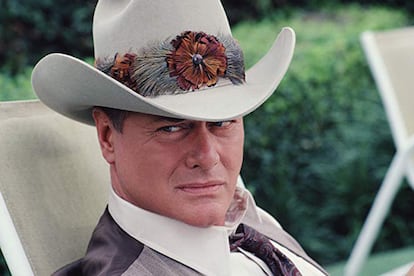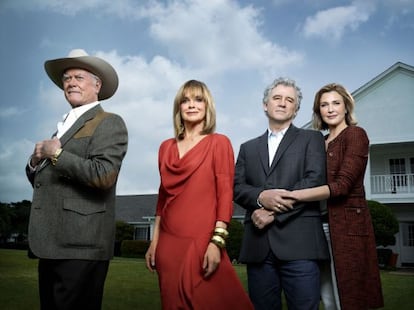The night J.R. was shot
In the early 1980s, Spain succumbed to the bobbing beauty of Bobby and Pamela, the ethylic Sue Ellen — the real heroine — and the unabashed wickedness of J. R. Ewing

In the early 1980s, my grandfather got “something.” In those days, we didn’t talk about strokes or aneurysms, you simply had “something,” an abstract disease that screwed up your life to a greater or lesser degree. Despite his struggle to maintain his independence, my mother brought him to our home, a two-bedroom apartment in an Asturian mining district 400 kilometers from his beloved Galician village. For someone whose idea of happiness was drinking mulled wine, dancing with his arms around himself and blowing kisses in the air — I have never doubted which person in the family I most resemble — to be under the yoke of a daughter who rationed his cigarettes and his cheap plonk was, he said, almost worse than death. It didn’t take me long to realize that I was going to be the main victim of that move. I slept in the living room and although I played the martyr for months, I was radiant as that unprecedented situation allowed me to enjoy unlimited access to the television, my greatest passion. Needless to say, the living room did not become a proper bedroom and no one else changed their habits. At an indeterminate hour the sofa bed was opened, but the TV was not turned off; my mother would just turn down the volume and order me to sleep as if she were Tony Kamo. Thus, I learned to watch with my eyes closed and so saw without seeing a myriad of “inappropriate” content: 79 Park Avenue, Captains and the Kings or Brideshead Revisited. How in love I was with Diana Quick, or Julia Flyte — at that time actors and characters seemed the same to me.
Of all the series that, more than watching, I sensed, I liked none more than Dallas. I was obsessed with the Ewings, the Southfork ranch, the cowboy hats and the white mansions, the height of luxury for someone who lived in a sixty-square-meter basement overlooking another basement. It was a shared passion: Spain had succumbed to the bobbing beauty of Bobby and Pamela, the ethylic Sue Ellen — the real heroine — and the unabashed wickedness of J. R. Millions of viewers surrendered to the exaggerated lives of those multimillionaires who, despite their opulence, dressed like farmers. It wasn’t until Dynasty and Alexis Morell-Carrington-Colby-Dexter-Rowan revamped the canon of the television wealthy, with their caviar-fueled breakfasts and opulent closets, that we began to feel real envy for the super-rich: if you have to suffer, let it be by drinking champagne in the Jacuzzi. Half the world was dazzled by Dallas, a series that, according to its creator David Jacobs, was inspired by Ingmar Bergman’s Scenes from a Marriage. How happy I was being the most haggard girl in school because of the dramas between the Ewings and the Barneses. A joy that always cut short the damned summer, the only time when television lost its prominence for everyone except me.
The worst came in August, when, like so many Asturian families, we would go to some village in León “to dry out.” My exciting days of television and roses were replaced by an anodyne life of hostels and municipal swimming pools, mothers with quirky rubber caps swimming with their heads up so as not to ruin the perm, and fathers who swapped the terylene for the Wrangler and the revolutionary “thousand stripes.” The most fashionable even succumbed to swimsuits, which they dried on the balcony at night. Every day was the same and only got better when — to alleviate my melancholy in front of that everlastingly turned off TV in the bar — they would give me a few coins to divide between Cola Jets and Space Invaders. Take 20 bucks and stop messing with the TV, kid. The idea of not seeing the conclusion of the series that caused my sleepless nights had me sulking the entire summer of 1982, but it was inevitable: Spanish broadcaster TVE had scheduled the season finale of Dallas, its star series, for August 17, something inconceivable today when the summer is nourished by reruns and trivialities.
As sad as I was resigned, that Tuesday I followed the pool and movie routine. That day Orca: The Killer Whale, was on, which was forbidden fruit, but the open-air cinemas were a lawless land: there you could steal your first kiss, smoke your first “imported” Winston, or at the age of 10 watch a toothed cetacean devour a distracted bather. As I dragged my flip-flops back to the hostel, I sensed something different, a hustle and bustle unbecoming of a weekday. As I approached, I saw the television on the terrace and the plastic chairs arranged in front of it; television as cinema, my idea of happiness. I lived so disconnected from adults that I couldn’t even imagine that we shared the same excitement about what was going to happen that night. After the end of the variety show 300 millones there was silence to honor Jerrold Immel’s theme tune and the iconic Dallas masthead — there are few occasions when the word iconic can be used accurately and this is one of them — with its “in alphabetical order” and its aerial shots of steers and oil wells (although there are no steers or oil wells in Dallas, but they realized that after they chose the name of the series; only the history of television is better than television itself).

At the tables, gin and tonic for the men and, for the women, Irish coffee. The women were condemned to alcohol in disguise, although they would surely have wanted to emulate the heroic Sue Ellen by pouring a good glass down their gullets, but what would be said would not be laid to rest even in the summer. For an hour I experienced an unprecedented emotion, more because of how it was happening than for what was happening. As had occurred in the past, the newspapers had already revealed the ending. EL PAÍS carried it that day in its television section: “Today the first part of the series Dallas ends with its main protagonist, J. R., mortally wounded with two shots to the body. In the United States, this outcome caused a commotion because viewers were unaware of it.” Tell me you have never read a spoiler with more ill-placed faith. What was worse, Henry Kissinger had told some journalists in Germany that the shooter was Kristen Shepard, J. R.’s sister-in-law, a scorned and pregnant lover. Yes, that Kissinger, the former U.S. Secretary of State... that was the level Dallas reached. Even the Queen Mother asked Larry Hagman to tell her who had shot him, but he didn’t say a word: he was more afraid of the wrath of the producers than of ending up in the Tower of London.
Despite that crazy success for CBS fiction, it has never been included in the golden age of television — or in the silver, bronze or chocolate age — but I have never again experienced such emotion before a non-sporting event. I hardly remember anything about the episode, but I do remember the devotion of the female parish and the apparent distance the men kept, while not missing a thing; the odd dirty joke at Pamela’s expense — her name gave free rein to the sophisticated humor we liked — and the shots that were celebrated like a goal in stoppage time. While the television, which I was the only one watching, happy not to pretend to be asleep, was broadcasting the latest edition of the news, the tables were filled with improvised small groups of people talking only about the fate of the diabolical J. R.; at the bar, my grandfather, perhaps the only adult who gave a damn about the Ewings, danced hugging himself and blew kisses in the air because collective joy is more intoxicating than mulled wine. I may forget many summer nights, but never that one.
Sign up for our weekly newsletter to get more English-language news coverage from EL PAÍS USA Edition
Tu suscripción se está usando en otro dispositivo
¿Quieres añadir otro usuario a tu suscripción?
Si continúas leyendo en este dispositivo, no se podrá leer en el otro.
FlechaTu suscripción se está usando en otro dispositivo y solo puedes acceder a EL PAÍS desde un dispositivo a la vez.
Si quieres compartir tu cuenta, cambia tu suscripción a la modalidad Premium, así podrás añadir otro usuario. Cada uno accederá con su propia cuenta de email, lo que os permitirá personalizar vuestra experiencia en EL PAÍS.
¿Tienes una suscripción de empresa? Accede aquí para contratar más cuentas.
En el caso de no saber quién está usando tu cuenta, te recomendamos cambiar tu contraseña aquí.
Si decides continuar compartiendo tu cuenta, este mensaje se mostrará en tu dispositivo y en el de la otra persona que está usando tu cuenta de forma indefinida, afectando a tu experiencia de lectura. Puedes consultar aquí los términos y condiciones de la suscripción digital.









































